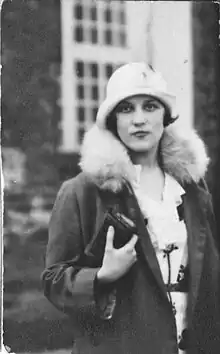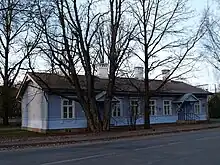Betti Alver | |
|---|---|
 | |
| Born | Elisabet Alver 23 November 1906 |
| Died | 19 June 1989 (aged 82) |
| Other names | Elisabet Talvik Elisabet Lepik |
| Occupation | Poet |
| Years active | 1922–1989 |
| Spouses |
|
Elisabet "Betti" Alver (23 November [O.S. 10 November] 1906 in Jõgeva – 19 June 1989 in Tartu),[1] was one of Estonia's most notable poets. She was among the first generation to be educated in schools of an independent Estonia. She went to grammar school in Tartu.[2]

Writing
She began as a prose writer. She became known for being a member of the Arbujad ("Soothsayers"), a small group of influential Estonian poets including Bernard Kangro, Uku Masing, Kersti Merilaas, Mart Raud, August Sang, Heiti Talvik and Paul Viiding. After the war her husband Heiti Talvik was imprisoned by the Soviets and died in Siberia.[3] For two or three decades she was silent as a poet as protest of Soviet rule, but renewed activity in the 1960s. Of note in this second period is the 1966 collection Tähetund or "Starry Hour." She also wrote novels and did translation work.[4] On the hundredth anniversary of her birth a museum was dedicated to her in Jõgeva.[5]
References
- ↑ Bédé, Jean Albert; Edgerton, William Benbow (1980). Columbia dictionary of modern European literature By Jean Albert Bédé, William Benbow Edgerton. ISBN 9780231037174. Retrieved 30 November 2014.
- ↑ "Estonian Literary Magazine". Archived from the original on 11 September 2010. Retrieved 30 November 2014.
- ↑ "Estonian Literature Information Centre". Retrieved 8 November 2021.
- ↑ Cummins, W.M.; Debeljak, A.; Haderlap, M.; Ihan, A.; Potokar, J.; Šalamun, T. (1993). Shifting Borders: East European Poetries of the Eighties. Foreign Policy; 9. Fairleigh Dickinson University Press. pp. 32–33. ISBN 978-0-8386-3497-4.
- ↑ "Jõgeva site". Archived from the original on 9 June 2007. Retrieved 30 November 2014.